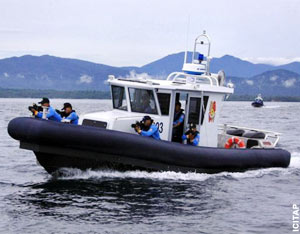For a long time, corruption has been condemned for many different reasons. But it has never been condemned for the threat it poses to security. Until now.
The International Anti-corruption Conference, which began November 10 in Bangkok, Thailand, heard calls for decisive and urgent action against corruption to combat the exponential growth of transnational organized crime. Corruption facilitates these crime networks and creates opportunities for terrorists and nuclear weapon proliferators, according to Gareth Evans of the International Crisis Group. The gravest threat may come from post-conflict countries and failed states where mafias often have either found safe havens or created alternative power structures, Bill Hughes of the U.K. Serious Organized Crime Agency said.
But bad news about transnational crime can actually be good news. Because it has grown beyond any single country’s capability to deal with it effectively, nations have no choice but to cooperate. Somali pirates are a good, but not the only, example of this proposition. To effectively respond to the threat, countries must go beyond making grandiose declarations and instead focus on relevant transnational issues, and cooperate and coordinate their actions.

A police officer checks a luxury car during a raid against an international gang in Costa del Sol, Spain on May 25, 2010. Spanish police worked with their counterparts in Britain and Ireland to track the suspects.
World powers must ensure that an effective international financial monitoring system is in place when they provide aid to post-conflict countries. Remedies in other nations should include private-public partnerships to secure global supply chains as well as law enforcement cooperation and customs capacity building. Cameroon was cited as an example of a developing country that has made progress on customs reform.
The United States took action to mobilize the international community against transnational crime when it launched Trans-Pacific Symposium on Dismantling Transnational Illicit Networks in 2009. The second symposium, organized jointly with New Zealand, is taking place later this month in Christchurch, New Zealand. Partnership with European countries is in the works.



